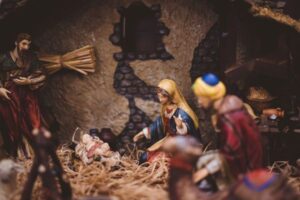PODCAST: read and listen to this entry at the same time (you can find the Spanish text here)
Christmas is one of the most important and longest festivities we celebrate in Spain. Spanish Christmas season starts on Christmas Eve and ends on Three Kings’ Day. During this period, schools, high schools and universities are closed and many companies close for a part of the festivities.
Christmas season begins on Christmas Eve which is always on December 24. On this night, families have dinner together. It’s a Christian tradition, and we celebrate the night Jesus was born. Usually, on this night we give presents which are put under the Christmas tree. It’s very common during those days to eat typical sweets like turrón, polvorones o mantecados. And the typical Christmas songs are called villancicos. Afterwards comes Christmas Day which is on December 25 and where we celebrate again Jesus’ birth. It’s the most important day and the families get together for lunch. It’s common for Spanish families to stay on the 24th with one part of the family and on the 25th with the other one.

And, of course, in the middle of the season there’s also New Year’s Eve and New Year’s Day. We’ll talk about those festivities another time because, although they are in the middle of the Christmas season, they don’t belong to it.
Christmas season continues in January with the arrival of the Three Kings loaded with presents. This holiday celebrates the arrival of the Three Kings in Bethlehem in order to see the Infant Jesus and we celebrate it on January 5 and 6. Here in Spain the Kings are the ones that traditionally bring the presents. However, nowadays Santa Clause does it as well. On January 5 we celebrate the night of Three Kings with a big parade called “Cabalgata de los Reyes Magos” in all the cities and towns, and children love it. That’s because the Three Kings and their entourage throw sweets nonstop and they bring the presents. Afterwards, at home, we open the presents and have a delicious roscón (Three Kings’ Cake) with hot chocolate. The day after, January 6, is Three Kings’ Day.
If you would like to learn about the customs of Three Kings’ Day you can read and listen to my podcast available in the entry about the Three Kings: click here.
Credits:
Featured image: dl Spanish lessons
Picture 01: Photo by Robert Thiemann on Unsplash
